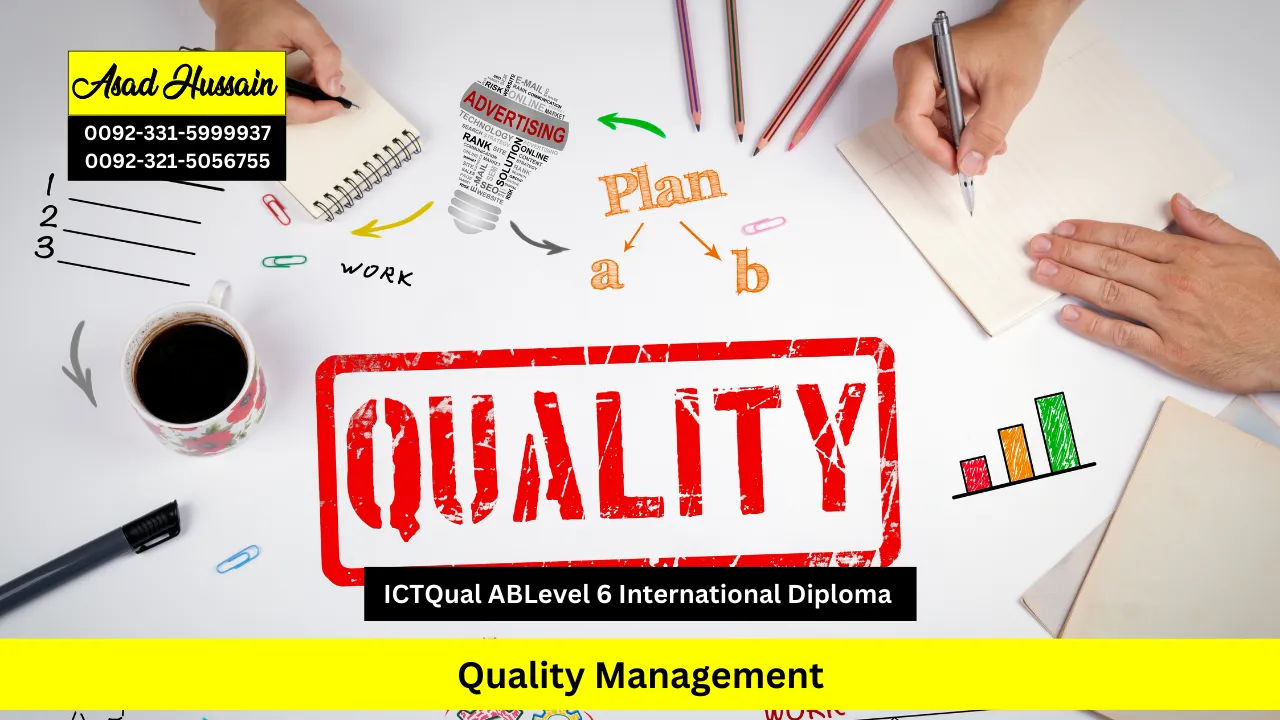In today’s competitive global market, organizations rely on effective quality management systems to ensure operational excellence, customer satisfaction, and regulatory compliance. The ICTQual AB Level 6 International Diploma in Quality Management is a high-level qualification designed to equip learners with the advanced knowledge and practical skills necessary to implement, monitor, and improve quality management systems across industries.
ICTQual ABLevel 6 International Diploma in Quality Management covers key aspects of quality management, including quality planning, process improvement, risk management, auditing, and compliance with international standards such as ISO 9001. Learners will gain the ability to analyze organizational processes, identify areas for improvement, and develop strategies to enhance product and service quality while minimizing risk and inefficiencies.
Through a combination of theoretical frameworks and practical applications, learners will develop the competencies required to lead quality management initiatives, conduct audits, and implement continuous improvement strategies. The ICTQual ABLevel 6 International Diploma in Quality Management prepares professionals to make informed decisions that improve organizational performance, ensure customer satisfaction, and maintain compliance with global quality standards.
Graduates of this diploma will be equipped with the skills and knowledge to take on senior roles in quality assurance, quality management, and operational leadership, ensuring that their organizations remain competitive, efficient, and compliant in today’s fast-paced business environment.
Program Highlights
Study Units
Year 1 – Foundations of Quality Management
- Principles of Quality Management and Assurance
- Fundamentals of Organisational Excellence
- Business Law, Compliance, and Regulatory Frameworks
- Introduction to Operations and Process Management
- Workplace Health, Safety, and Risk Control
- Quality Tools, Techniques, and Measurement Basics
- Data Analysis and Research Methods in Quality
- Business Communication and Professional Reporting
- Leadership Fundamentals in Quality-Driven Organisations
- Information Technology for Quality and Operations
- Problem-Solving and Decision-Making in Business Contexts
- Corporate Social Responsibility and Ethical Quality Practices
Year 2 – Applied Quality and Organisational Practices
- Total Quality Management (TQM) Principles and Applications
- Lean Management and Six Sigma Methodologies
- International Standards and Certification Frameworks (e.g., ISO)
- Advanced Risk Management and Compliance in Quality Systems
- Performance Management and Organisational Measurement
- Human Resource Management in Quality-Focused Organisations
- Supply Chain Quality and Vendor Management
- Quality Auditing and Continuous Improvement Processes
- Project and Programme Management in Quality Environments
- Strategic Marketing and Quality in Global Markets
- Ethics, Governance, and Sustainability in Quality Systems
- Innovation and Change Management for Quality Professionals
Year 3 – Advanced Strategic Quality Leadership
- Strategic Management for Quality and Business Growth
- Advanced Quality Theories, Models, and Practices
- Global Excellence Frameworks (EFQM, Baldrige, etc.)
- Leadership, Change, and Organisational Transformation
- Quality in Digital Transformation and Smart Technologies
- International Trade, Policy, and Quality Assurance
- Crisis Management and Business Continuity in Quality Systems
- Emerging Trends in Global Quality and Sustainability
- Advanced Research Methods in Quality and Organisational Studies
- Dissertation / Final Research Project in Quality Management
- Global Business Strategy and Competitive Advantage through Quality
- Future of Quality Management and Industry 4.0 Integration
o ensure learners are well-prepared for the challenges of the ICTQual AB Level 6 International Diploma in Quality Management, specific entry requirements have been established. These requirements guarantee that candidates possess the foundational knowledge, professional experience, and language proficiency necessary to successfully complete the program and apply quality management principles in practical settings.
Age Requirements
- Candidates must typically be 18 years or older to enroll in this Level 6 qualification.
- Mature learners above 21 years are encouraged to apply, especially those seeking career progression or professional development in quality management.
Educational Requirements
- Applicants should hold a Level 5 qualification or equivalent in quality management, business, or a related discipline.
- Equivalent international diplomas or prior completion of recognized programs in management, engineering, or operational roles are also considered.
Professional Experience
- Candidates with relevant work experience in quality assurance, operational management, or business process improvement may qualify for direct entry.
- Practical experience in implementing quality standards, audits, or continuous improvement initiatives is advantageous for applying theoretical knowledge.
English Language Proficiency
- Non-native English speakers must demonstrate proficiency through recognized tests such as IELTS 6.0 or equivalent.
- Strong English communication skills are required to engage with academic materials, assessments, and professional quality management case studies.
Meeting these entry requirements ensures that learners are fully prepared to engage with the course content and maximize the benefits of the program. By enrolling in this diploma, learners position themselves to gain advanced knowledge, develop practical skills, and advance their careers in quality management and organizational excellence.
The ICTQual AB Level 6 International Diploma in Quality Management equips learners with advanced knowledge, professional skills, and practical applications in the field of quality assurance, organisational excellence, and business process improvement
Year 1 – Foundations of Quality Management
Principles of Quality Management and Assurance
- Understand core principles and evolution of quality management systems.
- Apply quality assurance methods to achieve organisational objectives.
- Evaluate the role of quality in customer satisfaction and competitiveness.
Fundamentals of Organisational Excellence
- Analyse frameworks that promote organisational excellence and continuous improvement.
- Apply excellence models to enhance business processes and performance.
Business Law, Compliance, and Regulatory Frameworks
- Demonstrate knowledge of relevant legal and regulatory frameworks.
- Apply compliance principles to maintain organisational integrity.
Introduction to Operations and Process Management
- Map and analyse business processes for efficiency improvements.
- Implement operations strategies that enhance quality outcomes.
Workplace Health, Safety, and Risk Control
- Apply health and safety standards in quality-focused workplaces.
- Identify risks and implement control measures for safe operations.
Quality Tools, Techniques, and Measurement Basics
- Use basic quality tools (e.g., checklists, Pareto charts, control charts).
- Interpret measurement data to improve processes.
Data Analysis and Research Methods in Quality
- Apply quantitative and qualitative research methods to quality studies.
- Analyse data to support decision-making in organisational contexts.
Business Communication and Professional Reporting
- Prepare structured reports and documentation for audits and reviews.
- Communicate effectively in professional quality management settings.
Leadership Fundamentals in Quality-Driven Organisations
- Understand leadership styles suitable for quality teams.
- Apply motivational strategies to enhance performance and team cohesion.
Information Technology for Quality and Operations
- Use IT systems to support quality management processes.
- Evaluate emerging digital technologies for organisational improvement.
Problem-Solving and Decision-Making in Business Contexts
- Apply structured problem-solving frameworks in organisational scenarios.
- Use decision-making tools to address quality and operational challenges.
Corporate Social Responsibility and Ethical Quality Practices
- Apply CSR principles in quality processes to ensure sustainability.
- Promote ethical practices in organisational decision-making.
Year 2 – Applied Quality and Organisational Practices
Total Quality Management (TQM) Principles and Applications
- Implement TQM concepts to enhance customer satisfaction.
- Integrate continuous improvement strategies across business functions.
Lean Management and Six Sigma Methodologies
- Apply Lean principles to eliminate waste and optimise processes.
- Use Six Sigma tools to reduce variation and improve performance.
International Standards and Certification Frameworks (e.g., ISO)
- Demonstrate knowledge of international quality standards.
- Apply certification requirements in organisational settings.
Advanced Risk Management and Compliance in Quality Systems
- Analyse and mitigate risks in quality management systems.
- Apply compliance frameworks to organisational operations.
Performance Management and Organisational Measurement
- Develop and implement key performance indicators (KPIs).
- Use measurement results to enhance organisational efficiency.
Human Resource Management in Quality-Focused Organisations
- Align HR strategies with quality objectives.
- Evaluate training needs for quality-focused employees.
Supply Chain Quality and Vendor Management
- Assess supplier quality standards and performance.
- Implement vendor improvement strategies to ensure supply chain reliability.
Quality Auditing and Continuous Improvement Processes
- Conduct quality audits and generate corrective action plans.
- Evaluate audit results to promote continuous improvement initiatives.
Project and Programme Management in Quality Environments
- Apply project management principles to quality improvement projects.
- Manage resources, timelines, and risks in organisational programmes.
Strategic Marketing and Quality in Global Markets
- Analyse how quality impacts global marketing strategies.
- Apply positioning strategies aligned with quality standards.
Ethics, Governance, and Sustainability in Quality Systems
- Apply ethical frameworks in quality decision-making.
- Integrate sustainability practices within organisational quality systems.
Innovation and Change Management for Quality Professionals
- Lead innovation initiatives to enhance quality outcomes.
- Apply change management models to support organisational transformation.
Year 3 – Advanced Strategic Quality Leadership
Strategic Management for Quality and Business Growth
- Develop business growth strategies through quality initiatives.
- Evaluate the impact of quality on competitive advantage.
Advanced Quality Theories, Models, and Practices
- Apply advanced quality models in global contexts.
- Evaluate best practices to solve complex quality challenges.
Global Excellence Frameworks (EFQM, Baldrige, etc.)
- Apply EFQM and Baldrige criteria to organisational assessments.
- Benchmark performance against international excellence standards.
Leadership, Change, and Organisational Transformation
- Lead organisational transformation with a focus on quality.
- Promote a culture of innovation and continuous learning.
Quality in Digital Transformation and Smart Technologies
- Evaluate the role of digitalisation in quality improvement.
- Apply smart technologies to enhance organisational performance.
International Trade, Policy, and Quality Assurance
- Implement quality assurance practices in global trade operations.
- Ensure compliance with international trade and quality regulations.
Crisis Management and Business Continuity in Quality Systems
- Develop crisis management strategies for organisational resilience.
- Apply business continuity planning to maintain quality standards.
Emerging Trends in Global Quality and Sustainability
- Identify trends shaping future quality management practices.
- Apply sustainability principles in line with emerging global demands.
Advanced Research Methods in Quality and Organisational Studies
- Conduct advanced research in quality management.
- Present findings using professional reporting and analytical standards.
Dissertation / Final Research Project in Quality Management
- Undertake a comprehensive research project in quality management.
- Apply theoretical and practical knowledge to produce actionable insights.
Global Business Strategy and Competitive Advantage through Quality
- Develop strategies for achieving competitive advantage via quality.
- Evaluate organisational performance using strategic quality frameworks.
Future of Quality Management and Industry 4.0 Integration
- Assess the impact of Industry 4.0 technologies on quality systems.
- Apply digital and automation tools for next-generation quality management.
The ICTQual AB Level 6 International Diploma in Quality Management is designed for professionals, students, and career-driven individuals seeking to develop advanced skills in quality management and operational excellence. ICTQual ABLevel 6 International Diploma in Quality Management caters to learners aiming to enhance their leadership, analytical, and problem-solving capabilities within organizational and international contexts.
Educational Instructors and Trainers
- Deliver professional training programs in quality management using international standards and case studies.
- Design learning modules and curriculum to equip students with practical quality management skills.
Environmental Advocates and Activists
- Promote sustainable quality practices and corporate social responsibility initiatives.
- Influence policies and organizational strategies to ensure environmental stewardship and ethical operations.
Students and Recent Graduates
- Acquire specialized knowledge in quality management to prepare for careers in operations, audits, and compliance.
- Develop practical skills and theoretical understanding to excel in professional business environments.
Career Changers
- Transition into quality management, operational leadership, or consultancy roles with recognized Level 6 qualifications.
- Gain practical, strategic, and managerial competencies to enhance career prospects and employability.
Policy Makers and Regulators
- Develop, evaluate, and enforce policies that regulate quality standards and compliance frameworks.
- Promote ethical, sustainable, and responsible practices within organizations and industries.
ICTQual ABLevel 6 International Diploma in Quality Management is ideal for ambitious learners seeking to lead, innovate, and excel in quality management and operational excellence. Graduates will emerge as competent, strategic, and professional leaders capable of improving organizational performance, ensuring compliance with global standards, and driving sustainable business growth.







